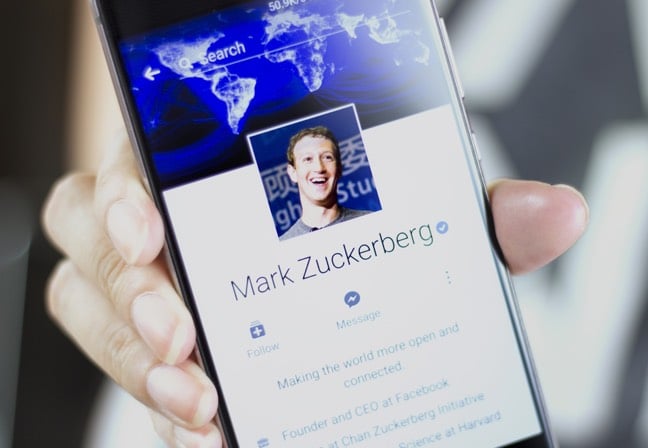Meta To Add Verification To Facebook And Insta Under Scheme That Should Avoid Twitter's Musk-stakes

Social network supremo Mark Zuckerberg announced on Sunday that the artist formerly known as Facebook will follow in the footsteps of Twitter by offering a paid service: Meta Verified.
For $11.99 a month on the web, or $14.99 a month on iOS, users of both Facebook and Instagram, age 18 and older, will be able to subscribe to a service that verifies their account with a government ID. Paying punters will be rewarded with a blue badge and extra protection against imposters – plus direct access to customer support.
Blue badges will also enjoy increased visibility and reach – including prominence in search, comments and recommendations. The increased visibility will vary depending on existing audience size and post topics, according to Meta's announcement.
All of which could translate into less fighting with distant relatives, and more "creator" content.
For now, businesses are not eligible for Meta Verified, although no doubt business owners as individuals are allowed. This policy could tamp down a shocking and blatant increase of corporate content and adverts – at least for the time being.
The service is to be rolled out this week in Australia and New Zealand, said Zuck, who also claimed the new product is about "increasing authenticity and security." Once verified, the user cannot change profile name, username, photo or date of birth without applying to Meta to do so.
Meta already offers a badge to certain users deemed "authentic and notable." Those users have been promised they will experience no changes.
Responding to a commentor on his Facebook feed, Zuckerberg said Meta "already [provides] protections and some support for everyone. But verifying government IDs and providing direct access to customer support for millions or billions of people costs a significant amount of money."
"Subscription fees will cover this and will also pace how many people sign up so we'll be able to ensure quality as we scale," said the CEO and John Denver afficionado.
The fanbois were out in full force to comment on the announcement, as were the critics.
"So what it comes down to is this. Using this form of social media is going to cost you … I shouldn't have to pay for the usage of this, My feed is so full of advertisements. I barely can see posts by friends due to that," commented one user.
"Enough is enough!! I'm going to Twitter, where a jpg of a blue checkmark only costs $8 a month," commented cartoonist and co-creator of Cyanide and Happiness, Rob DenBleyker.
- I'm happy paying Twitter eight bucks a month because price isn't the same as value
- Unlucky for some: Meta chops 13% of global workforce
- Musk tells of risk of Twitter bankruptcy as tweeters trash brands
- Meta trims datacenter build bills by $4 billion with new 'phased' design
Meta's paid service appears designed to avoid some of the (completely predictable) messes that happened when Twitter unveiled its Twitter Blue paid service.
The hasty rollout – which included providing anyone with a working credit card the same symbols of approval and authenticity as actual people or businesses – immediately led to an abundance of parody accounts that both confused and entertained users and sent many off to explore alternative social media sites.
Twitter Blue's first incarnation also had unpleasant real-world consequences: pharmaceutical company Eli Lilly's share price dropped by 4.5 percent when an impersonator tweeted that it would make inuslin free. A steady stream of hilarious yet dystopian copycat verified tweets followed.
By checking IDs, Meta appears to have learned from Twitter's mistake. Whether it has learned from its own mistakes – and will properly secure verified users' IDs – is another question.
Zuckerberg's Monster is hurting from a soft advertising market and the $10 billion revenue hole Apple kicked in its bottom line with privacy enhancements to iOS.
In November Meta slashed 13 percent of its workforce. It also trimmed its datacenter build bills by $4 billion, absorbing quite a few abandonment charges in the process.
On the latest earnings call Zuck declared 2023 Meta's "Year of Efficiency" to rein in costs and do more with less.
Amid all those cuts and efficiency drives, Meta keeps pouring money into its nebulous metaverse division – which lost over $13.7 billion in 2022, and has offered no indication of when the bleeding will stop.
Yet even if a million users sign up for the paid program, at $12 each per month, that only adds up to $144 million a year – a drop in the $113 billion ocean that is Meta's 2022 annual revenue. ®
From Chip War To Cloud War: The Next Frontier In Global Tech Competition
The global chip war, characterized by intense competition among nations and corporations for supremacy in semiconductor ... Read more
The High Stakes Of Tech Regulation: Security Risks And Market Dynamics
The influence of tech giants in the global economy continues to grow, raising crucial questions about how to balance sec... Read more
The Tyranny Of Instagram Interiors: Why It's Time To Break Free From Algorithm-Driven Aesthetics
Instagram has become a dominant force in shaping interior design trends, offering a seemingly endless stream of inspirat... Read more
The Data Crunch In AI: Strategies For Sustainability
Exploring solutions to the imminent exhaustion of internet data for AI training.As the artificial intelligence (AI) indu... Read more
Google Abandons Four-Year Effort To Remove Cookies From Chrome Browser
After four years of dedicated effort, Google has decided to abandon its plan to remove third-party cookies from its Chro... Read more
LinkedIn Embraces AI And Gamification To Drive User Engagement And Revenue
In an effort to tackle slowing revenue growth and enhance user engagement, LinkedIn is turning to artificial intelligenc... Read more

